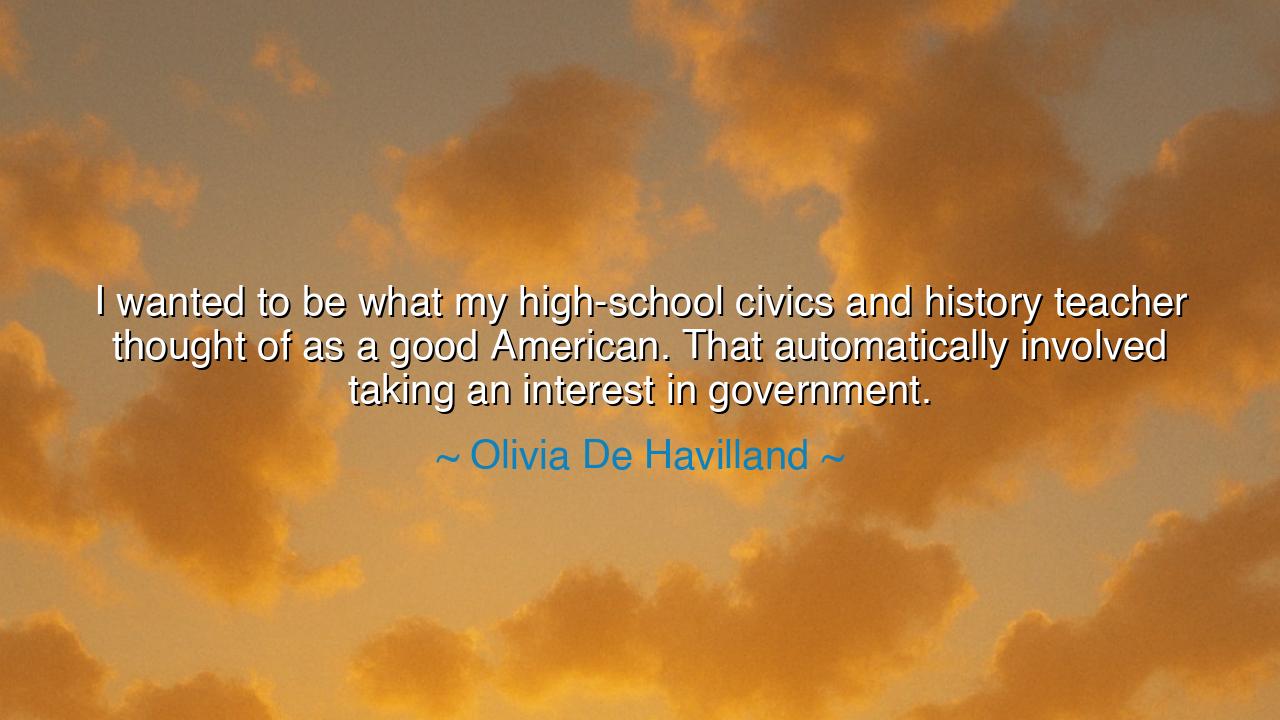
I wanted to be what my high-school civics and history teacher
I wanted to be what my high-school civics and history teacher thought of as a good American. That automatically involved taking an interest in government.






Olivia de Havilland, the luminous actress who carried both grace and strength, once confessed: “I wanted to be what my high-school civics and history teacher thought of as a good American. That automatically involved taking an interest in government.” These words, though spoken from memory, hold a deep resonance for all who ponder what it means to belong to a nation and to carry the duties of citizenship. For in her voice we hear not only admiration for a teacher, but the recognition that ideals, when instilled early, can guide the course of an entire life.
O listener, see the wisdom here: a single teacher, passionate about civics and history, awakened in a young student the desire to live not for herself alone but for her country. In the heart of Olivia de Havilland, this seed took root—the conviction that to be a true American was not merely to enjoy freedoms, but to safeguard them, to understand their origin, and to serve the community through awareness of government. Such is the hidden power of a teacher: not only to instruct, but to kindle the fire of responsibility in the soul.
Consider the great stories of the past. When Pericles of Athens urged his people to care for the polis, he spoke of the citizen’s sacred duty to participate in the life of the city. To live well was not to withdraw into private gain, but to join in the shared labor of government, ensuring justice and liberty for all. Likewise, de Havilland’s words remind us that democracy cannot survive without citizens who care, who question, who seek to be “good” in the eyes of those who taught them what goodness meant.
This quote also reflects the era in which she was raised. As a child of the early twentieth century, Olivia de Havilland grew up in a time when patriotism was often linked to civic virtue, when the lessons of civics classes were taught not merely as facts, but as moral duties. Her teacher did not merely teach history as dates and battles; he instilled ideals—courage, fairness, duty—that she long carried within her. In remembering him, she acknowledges that her sense of citizenship was not born of politics alone, but of personal inspiration.
Yet her words contain a challenge as well: how many of us today have forgotten what it means to be a “good citizen”? Too often, people withdraw, consumed by private lives, leaving the affairs of government to others. But democracy withers when its people grow indifferent. Olivia’s reflection reminds us that to be “a good American”—or indeed a good member of any nation—requires participation, interest, and care. One cannot love the freedoms of a land and neglect the duties that preserve them.
The lesson is eternal: the ideals we hold, the vision of what it means to be good, are often given to us in youth by those who believed in us. Cherish these ideals, for they are treasures more valuable than gold. And if you are a teacher, remember your power: your words may shape not only scholars but citizens, not only individuals but generations. A single conversation, a single lesson in civics, may inspire someone to take up the work of justice and governance.
Therefore, children of tomorrow, take Olivia de Havilland’s wisdom into your hearts. Do not be content to live only as one who receives. Live as one who gives, who participates, who carries the flame of responsibility for the community. Take an interest in government, for it shapes the destiny of all. Let your life be a testament to your teachers, to the ideals they entrusted to you, and to the enduring truth that freedom lives only where citizens care for it.
For in the end, her words remind us of a simple but powerful truth: to be a good American, or a good citizen of any land, is not defined by birth alone, but by the choices we make, the care we give, and the interest we take in the life of the people. Let us honor that truth with courage, diligence, and love.






AAdministratorAdministrator
Welcome, honored guests. Please leave a comment, we will respond soon